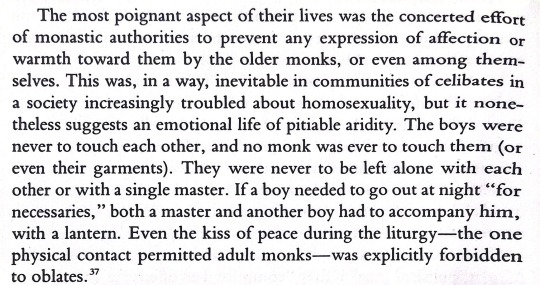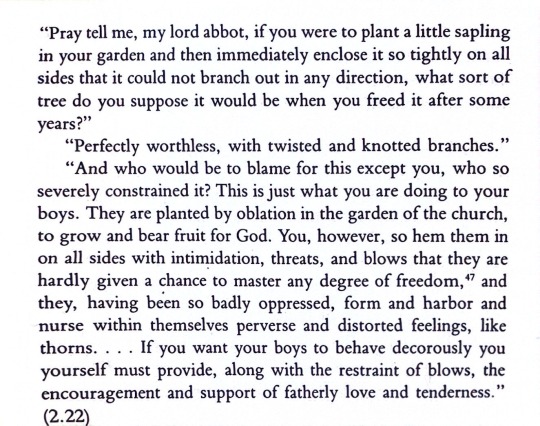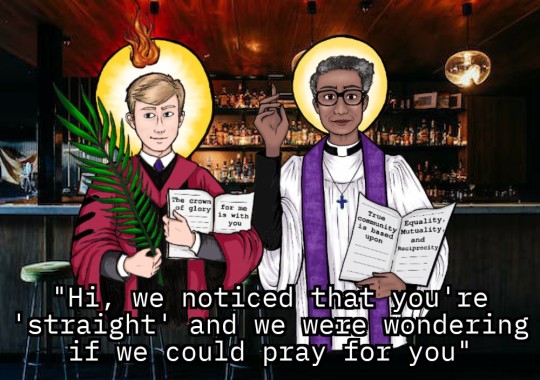#john boswell
Explore tagged Tumblr posts
Text




girl help
14 notes
·
View notes
Text

[ID: … meeting theological or canonistic niceties was probably of less concern to a mostly illiterate Christian community than public symbolism and community acknowledgement—living long together and sharing a home might have been the crucial determinants for a male-female pair in their concrete social context (i.e., among neighbors, friends, and relatives), whether or not they had children or took part in a church service. And in the case of the same-sex ceremony, standing together at the altar with their right hands joined (the traditional symbol of marriage), being blessed by the priest, sharing Communion, and holding a banquet for family and friends afterward—all parts of same-sex union in the Middle Ages—most likely signified a marriage in the eyes of most ordinary Christians.
Moreover, the concept of someone innately and exclusively "homosexual" was largely unknown to the postclassical world, and relationships of this sort were not understood in a sense comparable to modern "gay marriage"—i.e., as a parallel alternative—although they did in fact bear much similarity both liturgically and in emotional import. That is to say, although such relationships may have been viewed as irrevocable, consuming, and paramount emotional commitments, "marriage" at the time was not regarded primarily as a means of emotional or sexual fulfillment, but simply as a mechanism for enhancing or perpetuating dynastic succession. Same-sex unions were thus neither a threat to nor a replacement of heterosexual marriage.]
#john boswell#same-sex unions in premodern europe#lgbt#lgbt christian#queer christian#queer history#a.txt
50 notes
·
View notes
Text
My first peer-reviewed publication. In which I discuss the history of sexuality's biggest debate: Essentialism vs Constructionism. Specifically, I discuss what we are doing when we say people from the Middle Ages were "gay." I argue that, for French philosopher Michel Foucault, finding the gay in the Middle Ages means catching a glimpse of a different kind of sex -- relations unlike the ones we are trapped in today.
The article focuses on the relations between Foucault and American medieval historian John Boswell. Boswell, who wrote a transformative book about "Gay People in the Medieval Europe" is usually described as the all-time Essentialist. He thought men who loved men, no matter the era, were Gay. Whereas Foucault is usually described as the all-time Constructionist, the fiercest critic of modern identities like "homosexual."
Indeed, when Boswell's book on "Gay People in the Middle Ages" came out, some readers criticised Boswell for his unrestrained use of the term "gay," and they used Foucault's philosophy as an anti-Essentialist point of reference.
By analysing the later volumes of Foucault's final masterpiece, The History of Sexuality, along with interviews he gave while writing it, I find that Foucault distinguished between "being homosexual" and "being gay." For Foucault, while "homosexual" is a narrow identity inherited from Victorian sexology, "gay" refers to the formation of new sexual relations, a transformative kind of a sexual experience.
And here comes the plot twist: Foucault developed this idea of "gay" while reading... John Boswell! Foucault even wrote a fan letter to Boswell to thank him for his work (Boswell himself wrote a very positive review of The History of Sexuality's later volumes). For Foucault, finding the "gay" in the Middle Ages means experiencing history in a different way, feeling sex otherwise.
The article is François·e Charmaille, "Queer Strategies of Gay History: Boswell's 'Weapons', Foucault's Expérience", Diacritics, 48.4 (2020), 102-121.
#gay#my work#foucault#john boswell#philosophy#philosophy of history#medieval history#history of sexuality
50 notes
·
View notes
Text



Patrice BOYET
"Nuits / Voix Mémoire"
(LP. Anagramme Production. 1983) [FR]
#patrice boyer#1983#france#contemporary#dance#rainer maria rilke#friedrich nietzsche#anne dreyfus#jean claude camors#john boswell#vincent limouzin#laurent hoevenaers#records
2 notes
·
View notes
Text
All of my icon-drawing, meme-making, and queer Christian history research has led to this moment:

The unstoppable tag team of the Reverend Doctor Pauli Murray and Professor John Boswell, King and Queen of gender and sexuality, 20th century queer elders and patron saints of LGBTQ Christians, have destroyed the cisheteropatriarchy once and for all
(They've also seen our online queer discourse and they're not impressed)
18 notes
·
View notes
Text
Winter, a lingering season, is a time to gather golden moments, embark upon a sentimental journey, and enjoy every idle hour.
John Boswell

Snowy stream, foraging fowl
16K notes
·
View notes
Text
Okay picture it. A version of Sherlock and Watson. They’re women. Sherlock has the same name, Sherlock Holmes, but Watson is Johanna Watson. It’s 1986, a year since Sherlock went over Reichenbach Falls. Watson decides to publish the unedited versions of the stories shes been publishing for years about the mysteries her friend had solved. At first they seem like normal versions of the stories, but as it goes on you realize that it’s actually a tragic love story in which Johanna and Sherlock fall in love with each other but Johanna is too repressed to ever come to terms with that and marries a man (Mark Morstan) who is nice but not meant for her, ending in a resigned confession at the end of the note Sherlock left for her at the falls and Watson’s marriage falling apart shortly after Sherlock leaves as she tries to figure out what Sherlock really was to her.
Now imagine Sherlock, somewhere in disguise on the other side of the world, Sherlock, desperate for news of her friend picking up a new copy of her friend’s new book, only to realize that it’s a confession Watson never though she would see.
#So that’s what I’ve been working on#Boswell posts#Sherlock holmes#gender swapped Sherlock holmes#Girl!sherlock#Girl!watson#John watson#johanna watson#Fic ideas
18 notes
·
View notes
Text



@breitzbachbea the gay priest confession loophole is everything to me. tbh....
13 notes
·
View notes
Photo
Ok this is going to be the most annoying lengthy comment of all time but I simply must, I’m sorry.
One interesting aspect of this discussion is the implication that fandom’s perspective this represents the shock of the new. However, there are extensive Christian traditions on the particular intimate relationships between Jesus Christ and Judas Iscarriot, Jesus Christ and Peter, and most of all, Jesus Christ and John the Apostle.
In the case of Judas, so much has been speculated and written about the kiss he gives Jesus in the garden of Gethsemane that a “Judas kiss” is its common own phrase, an idiomatic reference to a betrayal under the guise of affection. The event has a commemorative day in both the Western and Eastern Rite liturgical calendars (Spy Wednesday, aka Great and Holy Wednesday). While the Greek word used in the Synoptic gospels (specifically Matthew and Mark) to describe the kiss, καταφιλέω, kataphileó, can be contrasted with a different word, φιλεῖν, philein (typically, horny kidding), and is commonly used for a greeting, that’s not the only way it’s ever been perceived. Thank you to the Wikipedia editor who pointed and sourced that Lutheran theologian Johann Bengel claims that Judas *repeatedly kisses* Jesus, and that it is not just a singular kiss: https://biblehub.com/commentaries/bengel/matthew/26.htm
The additional reference to the use of the same word, καταφιλέω, kataphileó, to describe Alexander the Great kissing the Persian eunuch Bagaos in greeting - something the troops, with whom Bagaos was very popular, apparently demanded - might raise the odd eyebrow, and doesn’t entirely banish the ghost of the erotic from it: https://en.m.wikipedia.org/wiki/Kiss_of_Judas
The nature of the falling-out (friends to enemies to ???) between Judas and Jesus has been written on so much that I wouldn’t know where to begin or end. Flavius Josephus claimed Judas was a founder of the Zealots, a new divergent Jewish philosophy, but Josephus had also fully jumped ship to the Roman cause after his surrender and enslavement, and sought to blame the Roman War of 66��73 CE predominantly on the Zealots: https://en.m.wikipedia.org/wiki/The_Jewish_War
‘Iscarriot’ was not a surname (surnames as now used in the global north were not used by Jews in this era), but likely a reference to the Latin ‘sicarii’, a wielder of a dagger, and/or the Sicarii sub-group of the Zealots, who were well-known as political assassins. Speculation on the falling-out as being primarily political (Judas fed up that Jesus wasn’t acting against Roman rule enough) has been a long tradition, dating largely from Josephus, but it’s not the only one. Suffice it to say, Jesus/Judas and Judas/Jesus have long been implicitly and even explicitly speculated on.
Arguably the far stronger tradition, however, is about Jesus and John the Apostle (as distinct from other Biblical Johns including John the Baptist). Frequently considered to be the subject of the line referring to the “disciple Jesus most loved”, in the Gospel of John, this intimacy was so well-established that by the time James II was getting criticism for his extremely queer relationship with George Villiers, Duke of Buckingham, he famously defended their closeness as confirming to the highest ideals of friends: “as Christ had John, I have George”. More on James, George, and the criminalisation of sodomy here: https://www.port.ac.uk/news-events-and-blogs/blogs/democratic-citizenship/mary-george-homosexual-relationships-in-the-time-of-king-james-i-were-forbidden-but-not-uncommon
Rictor Norton makes reference to it, particularly in ‘Mother Clap’s Molly House’, his well/known history of C18 homosexuality: http://rictornorton.co.uk/eighteen/mother.htm
Detailed interview with Norton here (note that he has a tendency to be rather antagonistic towards bisexuality): https://notchesblog.com/2022/05/07/an-interview-with-historian-rictor-norton/
A fascinating historical coincidence maybe, but an account of a C17 same-sex marriage ceremony took place at the church of San Giovanni a Porta Latina “Saint John Before the Latin Gate". This church was dedicated to John the Evangelist, author of the Gospel of John and frequently identified as…John the Apostle. More in this book: https://notchesblog.com/2017/01/19/same-sex-marriage-in-renaissance-rome/
The Jesus/John relationship (no dynamics implied) was so well-established within the culture of early modernity that this only strengthened that reading. John Boswell made reference to it in his final and seminal (though also criticised) book, ‘The Marriage of Likeness’ : https://en.m.wikipedia.org/wiki/Same-Sex_Unions_in_Pre-Modern_Europe
More on his analysis here: https://www.independent.co.uk/news/gay-marriages-centuries-old-1570056.html
To this very day, the queer possibility of John/Jesus remains of keen interest to LGBTQIA and progressive Christians, and pops up quite frequently: https://amp.theguardian.com/commentisfree/belief/2012/apr/20/was-jesus-gay-probably
The TLDR of this interminable comment is probably: the established shipping wars of Christianity long predate us, so yeah why not make the boys of 1st century CE Judea kiss? That “Jesus FUCKS” tag isn’t blasphemy, it’s ~theology.

sometimes i’m like ‘fanfiction can’t shock me anymore i’m numb to it’ then i find this shit
#jesus discourse#the early church#biblical history#theology#‘christ had john and i have george’#rictor norton#John Boswell#mother claps molly house#the marriage of likeness#same sex marriage in renaissance Rome
216K notes
·
View notes
Text
Infernally Yours - the latest 2000AD, on sale now!
The striking cover from "Azimuth" artist Lee Milmore for 2000AD Prog 2344, on sale now, will haunt you until you buy a copy, and there’s plenty of action and adventure on offer, too, adding to this issue's appeal
The striking cover from “Azimuth�� artist Lee Milmore for 2000AD Prog 2344, on sale now, will haunt you until you buy a copy, and there’s plenty of action and adventure on offer, too, adding to this issue’s appeal. Especially, for me, Tom Foster‘s art on “Judge Dredd“, and Eoin Coveney‘s art on “Portals“, complementing a dark, unsettling script from John Tomlinson. It’s on sale now in all good…

View On WordPress
#2000AD#Annie Parkhouse#Azimuth#Chris Blythe#Dan Abnett#David Barnett#downthetubes News#Eoin Coveney#Jim Boswell#Jim Campbell#John Tomlinson#Judge Dredd#Judge Dredd Megazine#Judge Hershey#Ken Niemand#Lee Milmore#Matt Soffe#Quinton Winter#Rob Williams#SF Comics#Simon Bowland#Simon Fraser#Surfer#Tazio Bettin#Tom Foster
7 notes
·
View notes
Text

[ID: a grayscale reproduction of a Soviet stamp showing two men kissing and embracing one another. Dates on the stamp read 1918 & 1968.
Text underneath it reads: Figure 1. This Soviet stamp, showing the grateful reception by the peasantry of Russian soldiers returning from World War II, was not shocking to Russians, who entertained less horror of homosexual interaction than did their Western contemporaries. It is possible that the artist was gay, and concocted the scene for his own delight, but that remains uncertain.]
#from ‘same-sex unions in premodern europe’ by john boswell#obviously This isn’t premodern but he’s making points abt how far reaching the influence of the roman empire continued centuries later#& how the institution of marriage developed differently in the eastern & western halves of the roman empire#marc.txt
9 notes
·
View notes
Text
"In Xenophon of Ephesus' romance novel, the Ephesiaca, two boys about the same age fall in love, but one takes on the role of 'lover' and must undertake to rescue the other from the clutches of an older man by abducting him at swordpoint from the latter's home, having had to sell all his belongings and take sail to get there."
damn the ancient greeks wrote some choice yaoi
#taken from same-sex unions in premodern europe by john boswell#really good book that i recommend although i feel a bit too dumb to fully make use of the knowledge in it#there's a lot about the ways in which specific latin and (ancient) greek words are translated and what they actually mean in context#that completely goes over my head as someone who has never studied either#this book is liberally referenced in pretty much every queer history text i've picked up though so i really wanted to read it lmao
2 notes
·
View notes
Text
“Victorians were way more misogynistic than medieval people” have you considered misogyny as like an expression of power dynamics within the context of a period and not just a simple sliding scale of Less or More or is nuance like. entirely dead
#I’m being real bitchy about a fairly innocuous post and I apologise for that but like#firstly I am once again pleading with people to stop saying medieval and instead say what you Actually Mean (in this case: Franks)#secondly ask your average 12th century Frankish guy to explain Women As A Concept and I’m sure you would get a very. fun response#I am really struggling to explain this in a meaningful way but like it’s the conflation of misogyny with women’s liberty to do stuff#which I really feel are separate and completely contextual#it’s just two different fucking things. pointing at 17th century Europe and then 6th century China and being like ‘ah! one of these is#more bureaucratic than the other!’ okay but they are not the same thing is the thing#anyway their point about class > gender is true but everything else is just. there’s something about the phrasing that is under my skin#I know the urge to do a John Boswell. i understand it. it’s good and kind and empathetic#(aka to point at ‘medievals’ and go ‘more like me than you’d think! and they wouldn’t have hated me!’)#doesn’t make it good fucking history though does it
9 notes
·
View notes
Text
2 notes
·
View notes
Text
I like that comparison.
sometimes you guys are extremely strange but i have to forgive you because to me mutualship is like catholic marriage where you have to put up with weird bullshit forever amd you cant get a divorce no matter what
#of course I am GAY so I will Never Be Married. as a Catholic. officially. There are other channels though.#John Boswell help me#what was the Secret Gay Marriage Rite in the Eastern Roman Empire called?
15K notes
·
View notes
